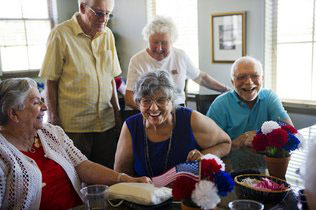当前位置: Language Tips> 双语新闻
|
 Jackie Merz, center front, and her husband, Bill, right, both 75, laugh with friends, from left, Jean Haglund, and Joe and Rita Frey at Eskaton Village in Roseville. |
|
In a spirit of gratitude and giving back to the parents who raised them, Bill and Jackie Merz's daughters have extended a generous invitation. "They both live in Chicago now," said Bill Merz, 75, a retired Sacramento State psychology professor. "One was willing to put an extra floor on her house and install an elevator for us so we could live there. The other wanted to convert her basement for us. "I told them we'd have somebody shoot us before we did that." The Merzes, who live in their own home at Eskaton Village Roseville, adore their extended, close-knit family, which also includes two sons in California and 11 grandchildren. But the idea of living with the kids in their older age leaves them cold. "My first reaction was, 'I don't want you telling me what to do,'" said Jackie Merz, who is also 75 and a retired teacher and counselor. Most older adults tend to be a bit more euphemistic about it: Typically, they say that they don't want to be a burden to their kids, or that they don't want to impose. But statistics show a plainer truth. In huge numbers, seniors relish their freedom, and they want to live on their own as long as they can. In the Sacramento region, US census figures show that almost three-fourths of people 65 and older live in same-generation (as opposed to multigenerational) households. National figures are even higher, with nearly 80 percent of older adults living in their own households – more than triple the number from the 1940s. A recent survey from the research firm Gallup & Robinson highlights that sense of independence. While 53 percent of people below age 65 said they would take in an aging parent who needed their help, only a quarter of people older than 65 said they would accept an invitation to live with their grown children. Those attitudes fly in the face of a stubborn cultural cliché, in which the grandparents, kids and grandkids grow older together under one roof – a holdover from the days when there was no choice but for the generations to live together, like it or not. "I think the stereotype exists because we continually look retrospectively," said Bill Merz. "It becomes a museum piece. Look at TV shows and movies about Christmas, the nuclear family they show. "It hasn't been that way since World War II. GIs didn't come back from the war and move to Mom and Dad's neighborhood. They moved to the suburbs or across the country." (Read by Nelly Min. Nelly Min is a journalist at the China Daily Website.) (Agencies) |
比尔•默茨和杰基•默茨夫妇的女儿们一心想要感谢和回报父母的养育之恩,对他们慷慨相邀。 “她们两个现在都住在芝加哥,”现年75岁的比尔•默茨说。他曾是萨拉门托州立大学的心理学教授,现已退休。“一个想要在她家的房子里加一层,给我们装上电梯,这样我们就能住在那儿了。另一个想把地下室改装给我们住。” “我告诉她们如果要这样,还不如毙了我们。” 默茨夫妇住在他们艾斯卡顿村罗萨维尔区自己的家中,非常热爱他们紧密团结的大家庭,除了两个女儿,他们还有两个住在加利福尼亚的儿子和11个孙子和孙女。但想到自己的晚年要和孩子们住在一起,他们感到很不快。 现年75岁的杰基•默茨说:“我的第一反应是:我不需要你来告诉我怎么做。”她曾是一名辅导教师,现在也已退休。 多数老人对此的态度会委婉一些。通常,他们会说他们不愿成为孩子的负担,或他们不想强行要求孩子接纳他们。但数据却更直白地反应了真相。有相当多的老人很享受他们当下的自由状态,想尽可能地自己生活。 在美国萨拉门托州,人口普查数据显示,65岁以上的老人当中有近四分之三和同代人一起居住,而不是多世同堂。全国范围内这一比例甚至更高,将近80%的老人住在自己的房子里——比上世纪40年代这一数据的三倍还要高。 盖洛普暨罗宾逊调查公司最近的一项调查便凸显了这种自立感。65岁以下的人有53%表示他们愿意与需要他们帮助的年迈父亲或母亲同住,而65岁以上的人只有四分之一表示会接受其成年子女的邀请与之同住。 这种态度公然挑战了顽固的传统文化观念。在旧观念里,祖父母,子女,孙子和孙女应该在同一屋檐下生活,成长,老去,这是从远古时代遗留下来的传统——那时,无论喜欢还是不喜欢,人们没有选择,只能多代同堂。 “我觉得这种老思想仍然存在是因为我们总是在追溯过去,”比尔•默茨说,“这玩意儿已经是博物馆里的古董了。看看电视和电影里核心家庭是怎么过圣诞节的。” “自从二战以来人们就不那样生活了。士兵们从战场归来后,并没有搬到父母的住宅区里。他们到郊区去居住,或在全国各地落脚。” 相关阅读 (中国日报网英语点津 陈丹妮 编辑:Julie) |
|
Vocabulary: euphemistic: 委婉的 relish: 喜爱,享受 fly in the face of: 悍然不顾,公然违抗 holdover: 剩余物;从前一时代过来的人(或物) retrospectively: 回顾地,怀旧地 GI: Government Issue 美国兵;美国现役或退伍军人 |
上一篇 : “伪装来电”成约会必备脱身神器
下一篇 : 苏格兰现“组装”木乃伊
电话:8610-84883645
传真:8610-84883500
Email: languagetips@chinadaily.com.cn